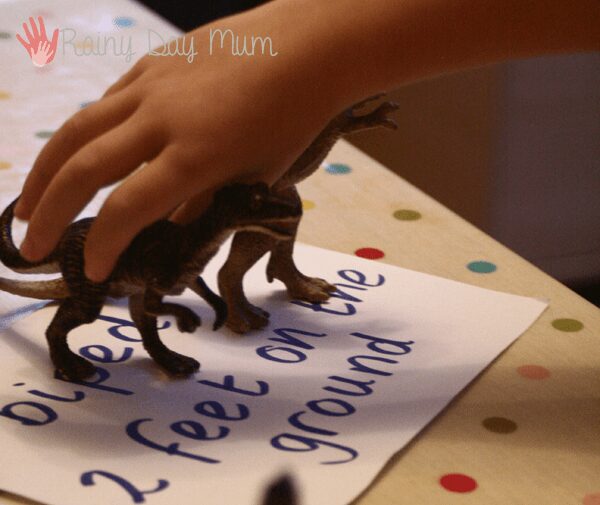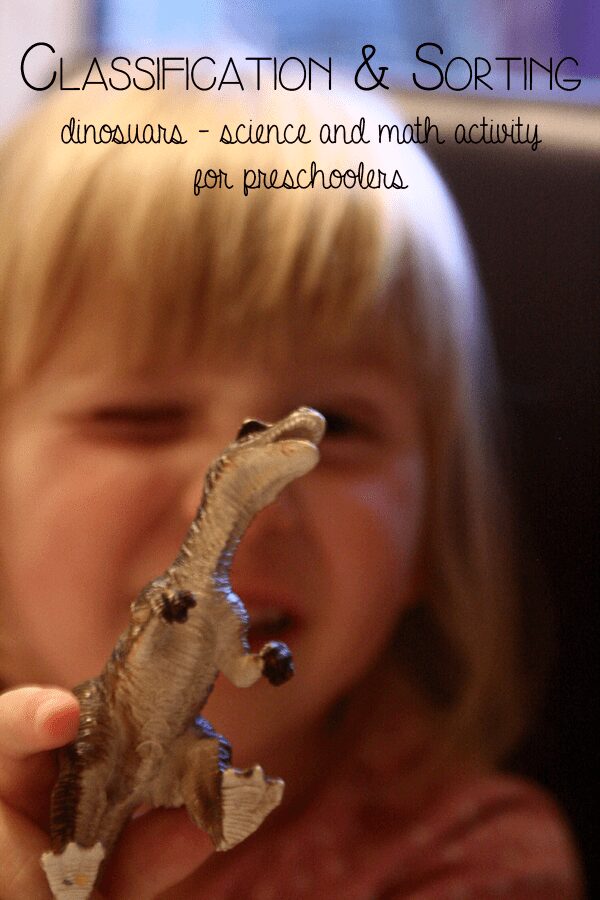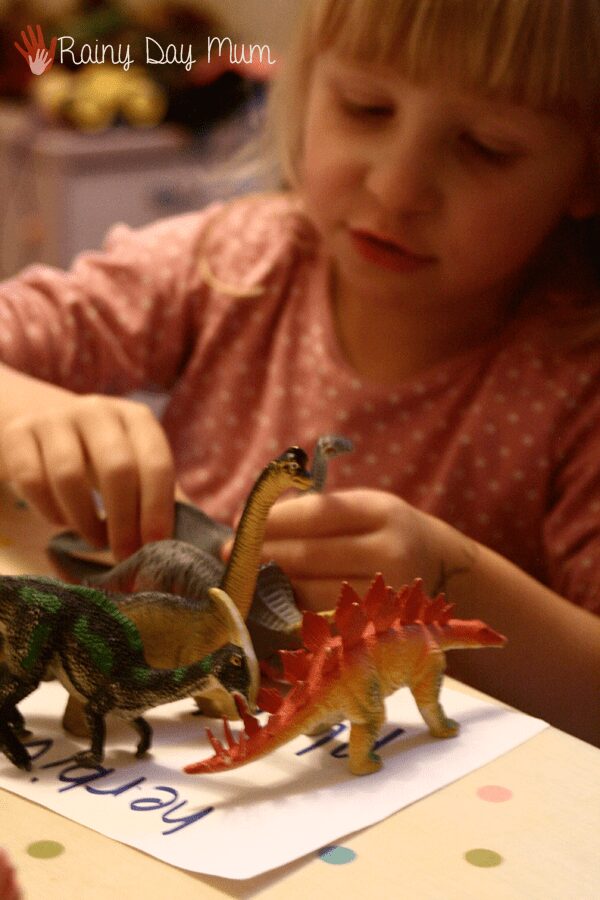Hands-on Classification and Sorting Activity with Dinosaurs for Kids
Dinosaurs are always a favourite with kids and mine are no exception – in fact what I’ve learnt in the last 5 years is more than a semester of Evolution of Vertebrate Animals at university. This week #playfulpreschool theme is Dinosaurs, each Wednesday we are sharing a preschool learning/creative activity based around a theme with bloggers from the Playful Preschool group.
Looking at areas that we have covered before I wanted to work on T’s strengths this week, she struggles with Letter activities but adores Maths and Science based activities so using our toy dinosaurs I combined the two introducing some new Scientific terms and reinforcing some maths concepts that she feels comfortable with. My kids love learning proper scientific terms, they pick them up as I answer questions forgetting that they are 3 and 5 as well as from reading and watching wildlife documentaries.
With dinosaurs, there were 2 easy scientific concepts that I wanted to introduce – how animals move, either bipedal or quadrupedal and what they ate, carnivore or herbivore and then used these terms to sort into groups.
Materials needed
Range of Dinosaur Figures [affiliate link]
Marker Pen
Paper
Access to information about dinosaurs for you and your child to read and explore together
Preparation
Collect together the Dinosaur Figures [affiliate link] – make sure that you know what their names are (our’s have the names on the bottom) and also google so you know whether they are a herbivore or carnivore.
On separate pieces of paper write Bipedal, Quadrupedal, Herbivore and Carnivore – I wrote a simple explanation underneath each. Bipedal – 2 feet on the ground, Quadrupedal – 4 feet on the ground, Herbivore – plant eater and Carnivore – meat eater.
Learning Objectives
- Practice sorting into 2 groups
- Learn how animals move – bipedal or quadrupedal
- Learn what animals eat – carnivore, herbivore or omnivore.
Activity Classification and sorting of dinosaurs

Start off with reviewing the dinosaurs from the toy collection – name the dinosaurs and ask questions about what your children know about the dinosaurs, you may be surprised at what they have picked up – we’re big fans of the Harry and the Bucketful of Dinosaurs books [affiliate link] and the Dinosaur Train TV series [affiliate link] and what they have picked up from these astounds me at times.
I then explained the two concepts – how the dinosaurs either moved by walking on 2 feet or 4 feet – bipedal or quadrupedal, of course I then had questions about the swimming dinosaurs like Ichthyosaur and the flying dinosuars like the Pteradons – but even those fall into bipedal or quadrupedal – swimming dinosaurs tend to have 4 flippers, and flying have 2 wings but walk on two feet similar to birds so are bipedal.

We then looked at the two main diets – herbivores or carnivores – because we can’t tell exactly what dinosaurs ate the knowledge has been gained by looking at the skeletons and then using knowledge or animals now to guess whether they are herbivores or carnivores – look at a resource such as Science for Kids.
With our Dinosaur figures T then started to sort into bipedal or quadrupedal – at first she would pick up the dinosaur and count each leg that touched the floor.

But she quickly moved on to being able to pick up a dinosaur and tell me whether they were bipedal and quadrupedal (2 or 4 feet on the ground) – this is fantastic as it’s working on recognising basic patterns similar to how we know the pattern of dots on a dice represent a certain number, on a 6 sided die we don’t have to count each dot individually we know the a set of dots (more than 2) in a diagonal is 3, whereas dots in each corner is 4 and 2 rows that fill up the dice means it’s a 6. Those patterns are imprinted on our brain and it’s part of our basic early years maths knowledge.
Once the dinosaurs were sorted into how they moved we then moved onto what they eat. Meat or Plants (Carnivore or Herbivore), one of the things that T had picked up from talking about the dinosaurs was that BIG teeth meant meat eater and no teeth meant a plant eater so she examined each dinosaur and then sorted them into the two classifications.
Although Scientific Classification is much more in-depth than this starting to introduce classification and sorting like this early on builds the basic foundation for children to develop their knowledge further.
Additional Dinosaur Activities for Preschool by the #PLAYfulPreschool Education Team:
Dinosaur Math Play by The Educators’ Spin On It
Dinosaur Dig for Fossil Puzzles by Mom Inspired Life
Dinosaur Theme for Preschool: Hatching DINO Eggs – Early Math & Science.by The Preschool Toolbox
Dinosaur Activities: Beginning Sound Fossil Matching by Growing Book by Book
Classification and Sorting of Dinosaurs by Rainy Day Mum
Can You Be A Dinosaur? by Learning 2 Walk
Dinosaur Sensory Play by Still Playing School
Dino-Gourd Dinosaur Egg Hunt by Capri + 3
Dinosaur Hatching by Tiny Tots Adventures
Dinosaur Hunting with Paint by Powerful Mothering
Hands-on Play-based Dinosaur Activities by Raising Lifelong Learners
Dinosaur Habitat Sensory Play With Slime by Little Bins for Little Hands
Backyard Dinosaur Dig by The Kennedy Adventures
Cerys Parker
Cerys is a marine biologist, environmental educator, teacher, mum, and home educator from the UK. She loves getting creative, whether it is with simple and easy crafts and ideas, activities to make learning fun, or delicious recipes that you and your kids can cook together you'll find them all shared here on Rainy Day Mum.






I love the idea to classify the dinosaurs. My preschooler also loves Dinosaur Train on PBS.
We have lots of Dinosaurs, I think we need to work classifications. Thanks for the idea.
We have TONS of dino toys, so this would be a great activity for us to do. Thanks!
This is a great idea! We just need more dino figures!
I’m worried that I may not be able to classify our dinosaurs… only because I don’t know all of their names! LOL
Seriously? That is really cool!